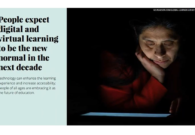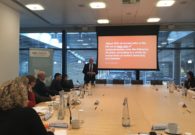Webinar: The Future of University Social Responsibility
On 8 September, the UK India Business Council (UKIBC) hosted an informative session focused on ‘The Future of University Social Responsibility (USR).’
Organised by the Higher Education division of the UK India Business Council, the India Dialogue (University of East Anglia), and the Centre for eLearning (University of Hyderabad) with a keynote speech made by Pankaj Mittal, Secretary General of the Association of Indian Universities, this webinar offered an opportunity for universities in the UK, India and beyond to share their insights and how they are contributing to USR.
The other participating universities in this webinar included Amity University, Asia University (Taiwan), University of Ruhuna (Sri Lanka), and Universidad Catolica del Maule (Chile). We are delighted to share this session also marked the first inputs from Amity as formal members of the Consortium.
Dr Pankaj Mittal, Secretary General of the Association of Indian Universities, gave a strong keynote speech in which she discussed how Indian universities are supporting local communities and, therefore, fostering social responsibility. USR is now known nationwide in India with universities across the country supporting communities and villages through research and teaching. Dr Mittal stressed the importance of giving recognition to teachers and students for USR. She noted that without this recognition, USR will not flourish in the desired way.
As co-convenor of the USR Consortium, Dr Rycroft (India Dialogue) emphasised the shifts that need to take place as the USR agenda moves from dialogue to implementation. In looking at the future of USR, the UN’s 2030 Agenda is significant here because it asks universities to commit to the Sustainable Development Goals (SDGs). Underpinning the SDGs are five principles: people centric approach to education and development; planetary engagement; poverty reduction; partnerships for peace; and sustainable partnerships for international cooperation.
Overall, contributors sought to find bridges between these principles and current activities undertaken by universities and relevant stakeholders. India’s new National Education Policy (NEP) may provide such a bridge. The new NEP makes a concerted attempt to repurpose education with the founding principles of the Indian constitution, namely Indian secularism, commitment to human rights and dignity, and recognition of India’s social minorities role in the development of the country.
USR was described as an ‘intellectual vaccine,’ meaning the spread of ideas, or raw injection of ideas, into society by research. There is a further importance on finding the right way to implement these ideas. It is important to note that USR is a dynamic, not static, concept, that will continue to evolve with our ever-changing environment.
A question to keep in mind when considering USR is ‘What can universities do for society?’ Many universities are responding this question by instilling entrepreneurship and creativity into their students. Through supporting students and communities’ skill sets, the hope is that this will contribute to innovative solutions that will benefit society.
Those universities which participated in this webinar shared information on a vast array of interesting case studies to highlight the ways they are contributing to USR. A few examples include providing scholarships to those in need, including funding for about 1,000 female students; sending students overseas to support community service; student volunteering; helping graduates find jobs; providing opportunities for students to raise money; participating in sustainability activities; devising new curriculum and coursework; including practitioners as teachers; and applying AI to USR to solve social problems.
USR can, and should, involve different kinds of academic corporations and/or approaches, presenting an opportunity for colleagues to be resourceful in how they approach it. At the moment, really good work is happening, but much of it needs to find greater synergy with the high principles mentioned. The USR Consortium is the mechanism for bringing all this good work into a shared framework for enhanced institutional cooperation.
Spear-headed by UKIBC, in future months and years this joint initiative will facilitate regular interactions on, for example: socio-economic and environmental pressures, India’s new education policy, the UN’s Sustainable Development Goals, rapidly changing geopolitics, restricted mobilities, health insecurity, and heightened technological capacities, as each of these affect the how and the why of USR in India and beyond.
As custodians of a new USR framework, the Consortium will devise a system for identifying and maintaining both shared and differentiated social responsibilities.
Of the mentioned universities, we would like to thank the below individuals for sharing their thoughts and projects:
- Dr Daniel Rycroft, Chair – India Dialogue, University of East Anglia
- Professor B. Rajashekhar, Pro Vice Chancellor, University of Hyderabad
- Professor Richard Harvey FBCS, Academic Director of Admissions, University of East Anglia
- Professor G.S. Prasad, Director, TIE-U, Coordinator, R&D, University of Hyderabad
- Professor (Dr) Gurinder Singh, Group Vice Chancellor, Amity University
- Professor Yinghuei Chen, Dean, the International College & Dean, College of Humanities & Social Sciences, Asia University, Taiwan
- Professor Tilak P D Gamage, Senior Professor in Limnology and Water Technology, University of Ruhuna, Sri Lanka
- Dr Andrew Philominraj, Director, PhD in Education in Consortium, Universidad Catolica del Maule, Chile
- Dr Ranjeeva Ranjan, Postdoctoral Researcher, Universidad Catolica del Maule, Chile (Discussant)
- Dr Balasubramanyam Chandramohan, Institute of Commonwealth Studies, School of Advanced Study, University of London (Discussant)
- Professor Prabhakar Rao Jandhyala, Director, India Centre of Excellence in Information Ethics (ICEIE), University of Hyderabad
If you were unable to join our webinar on the day, or would like to through the webcast again, we invite you to watch the webinar below for the discussion in full.

 By Kealan Finnegan
By Kealan Finnegan 





